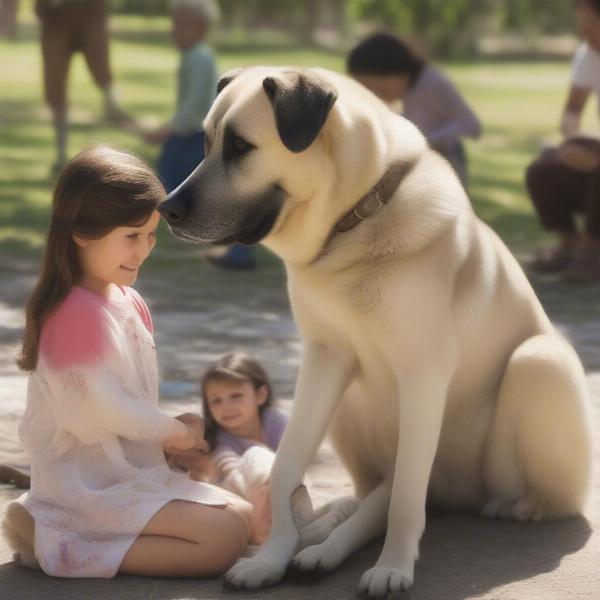Kangal dogs for adoption are a rewarding choice for experienced dog owners. These majestic livestock guardian dogs require a specific environment and understanding, so finding the right Kangal for adoption is crucial. This article provides valuable insights into the adoption process, breed-specific needs, and what to expect when welcoming a Kangal into your home.
Understanding the Kangal Temperament Before Adoption
Kangals are known for their intelligence, loyalty, and protective instincts. While gentle with their families, they can be wary of strangers and other animals. Early socialization is vital for a well-adjusted Kangal. Are you prepared for a large, powerful dog with specific exercise and training needs? Consider if your lifestyle aligns with a Kangal’s requirements. They thrive in rural environments with space to roam and a job to do, such as guarding livestock.
Finding Kangal Dogs for Adoption: Where to Look
Finding Kangal dogs for adoption requires dedicated searching. Specific breed rescues, livestock guardian dog organizations, and even local shelters might occasionally have Kangals available. Online resources like specialized forums and social media groups can also connect you with potential adopters. Be prepared to travel to meet the dog and assess its suitability for your home.
Preparing Your Home for a Kangal
Before bringing a Kangal home, ensure you have a secure, fenced yard. These dogs are known for their independence and patrolling instincts, so proper containment is crucial. Consider the climate as well; Kangals have thick coats and can be sensitive to extreme heat. Do you have a plan for providing ample shade and cool water? Think about existing pets too. Introductions should be slow and supervised, especially with smaller animals.
The Adoption Process: What to Expect
The adoption process for Kangal dogs for adoption may involve an application, home visit, and meet-and-greet with the dog. Rescuers will want to ensure a good fit for both you and the dog. Be honest about your experience and lifestyle. Are you ready for the commitment of owning a Kangal? Be prepared to answer questions about your property, family, and other pets.
 Kangal Dog Meeting a Family
Kangal Dog Meeting a Family
Kangal Health and Care: Long-Term Considerations
Kangals are generally healthy, but like all breeds, they can be prone to certain health issues such as hip dysplasia and bloat. Factor in the cost of regular vet checkups, vaccinations, and potential medical expenses. Are you prepared for the financial responsibility of owning a large breed dog? Their thick coat requires regular brushing, especially during shedding season.
Training and Socialization: Essential for a Well-Adjusted Kangal
Early socialization and consistent training are paramount for Kangals. Their protective instincts can manifest as aggression if not properly channeled. Enroll in obedience classes and expose your Kangal to various sights, sounds, and people from a young age. Are you committed to providing ongoing training and socialization throughout their life?
Conclusion: A Rewarding Companion for the Right Home
Adopting a Kangal can be a deeply rewarding experience. These loyal and intelligent dogs bring a unique blend of gentleness and guardianship to their families. However, they require a specific environment, understanding, and commitment to training and socialization. By carefully considering their needs and preparing your home, you can offer a Kangal a loving forever home and enjoy the companionship of this magnificent breed. Remember to research thoroughly and be patient in your search for Kangal dogs for adoption.
FAQ:
- Are Kangal dogs good with children? Kangals can be good with children within their own family, but early socialization and supervision are crucial.
- How much exercise does a Kangal need? Kangals need ample space to roam and regular exercise, ideally in a secure, fenced area.
- Are Kangals good with other dogs? Kangals can be wary of other dogs, especially those of the same sex. Careful introductions and socialization are essential.
- What is the lifespan of a Kangal dog? Kangals have an average lifespan of 12-15 years.
- Are Kangals easy to train? Kangals are intelligent but independent, requiring consistent and patient training.
- What is the best food for a Kangal? A high-quality, large-breed dog food formulated for active dogs is recommended.
- Do Kangals bark a lot? Kangals are known for their alert barking when guarding, but they are not typically excessive barkers.
ILM Dog is a leading international website dedicated to providing expert advice on dog care and breeding. We offer valuable resources on various topics, including breed selection, health, training, nutrition, grooming, and much more. Our aim is to empower dog owners worldwide with the knowledge and tools they need to provide the best possible care for their canine companions. For further information or personalized advice, please contact us via email at [email protected] or by phone at +44 20-3965-8624. ILM Dog is your trusted partner in your dog ownership journey.